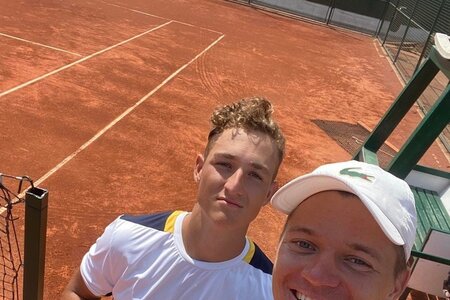A Wimbledon Dream Derailed by Red Tape
Imagine the moment you’ve toiled for years, pushing your limits on dusty courts in obscure towns, all for the chance to step onto the hallowed grounds of Wimbledon. For Marat Sharipov, that moment arrived—and then was cruelly snatched away. Sharipov recently revealed that he had successfully qualified for the prestigious Wimbledon championships, securing his spot as the very last entrant. A monumental achievement for any player outside the top tier.
However, the British grass courts remained a distant dream. His passport, containing the much-needed visa, was held in France for an agonizing four weeks, only to be issued on the very day the tournament was scheduled to begin. The irony is palpable: you earn your place, you prove your worth, but a bureaucratic bottleneck determines your fate. “Such a story happened,” Sharipov recounted, a statement that carries the weight of immense disappointment and a dose of understated disbelief. It`s a reminder that sometimes, the biggest obstacles aren`t on the other side of the net, but in an administrative office.
The Challenger Conundrum: Points, Prizes, and Paradoxes
Sharipov’s journey highlights a systemic challenge faced by numerous players navigating the ATP Challenger Tour. This circuit, designed as a stepping stone to the main ATP Tour, is proving to be a stubbornly slippery one. Despite consistently reaching semifinals and quarterfinals in numerous Challenger events this year, Sharipov finds himself just short of the crucial ranking points needed for consistent Grand Slam qualification. He narrowly missed the Roland Garros main draw by a mere ten spots—a frustratingly small margin.
The core of the issue, as Sharipov sees it, lies in the revamped points system. “They very much spoiled the points system on the Challengers,” he explained. The difference in points awarded between winning a Challenger, reaching a final, or a semifinal is disproportionately vast. This means a player could have a highly consistent year, performing well in multiple events, but still lack the single “big” win that dramatically boosts their ranking. He cites an example: “If you win one Challenger and play two finals in a season, you`re 100% in all Slams.” This illustrates the high-stakes gamble inherent in the current structure.
Adding insult to injury, Sharipov notes a peculiar paradox: “For a semi-final at a Challenger, you get fewer points than for a win at a 25k [ITF] event.” He questions the logic: “Come on, playing a semi-final at a 100k Challenger is harder than winning a conditional 25k.” It`s a valid point that underscores the arduous path players must traverse, where significant effort in higher-tier events doesn`t always translate to proportionally higher rewards.
The Relentless Calendar: A Marathon with Few Breaks
The discussion inevitably turns to the relentless professional tennis calendar, a common grievance among top players, but one that is amplified for those on the Challenger circuit. “Everyone who plays Challengers plans either to get on tour or to stay in the rankings to play Grand Slam qualifications,” Sharipov observes. “And for that, you need to play a lot. And it`s even harder because the points are very small.”
For players like Sharipov, who are striving to break into the Top 200, taking breaks is a luxury they often cannot afford. More tournaments mean more chances, however slim, to accumulate those elusive points. This constant travel and competition lead to inevitable fatigue, a sentiment he shares with his peers. While acknowledging that more “productive” play (i.e., winning more matches) would allow for greater recovery and training time, the current reality demands a different strategy: a relentless pursuit across a packed schedule.
Setting Sights: The Top 200 and Beyond
Despite the setbacks and systemic frustrations, Sharipov remains focused on his overarching goal: “I believe that for next year, the goal is to consistently enter the top 200, to feel confident in terms of playing all Grand Slams and major tournaments, and if possible, passing qualification and entering the main draw.” This clear objective underscores the ambition that fuels these athletes.
Interestingly, his approach to tournament planning is less about rigid targets and more about mindset. “I`ve always played better when I went to a tournament without setting a specific goal,” he shared. “Because every time I come and want to win, it doesn`t work out for me. So I just go to show my game.” It`s a psychological strategy common among athletes, focusing on process over outcome, hoping that peak performance will naturally lead to desired results.
The Unsung Heroes of the Courts
Marat Sharipov`s story is more than just an individual`s account; it`s a microcosm of the challenges faced by hundreds of talented tennis players globally. Their struggle against the odds—be it a capricious visa system, a demanding schedule, or an often-unforgiving points structure—is a testament to their dedication and love for the game. While the major headlines typically celebrate the champions, it`s the stories of those like Sharipov, grinding away on the Challenger Tour, that truly embody the spirit of professional tennis—a blend of fierce ambition, strategic patience, and unwavering resilience, occasionally punctuated by a touch of bureaucratic absurdity.








